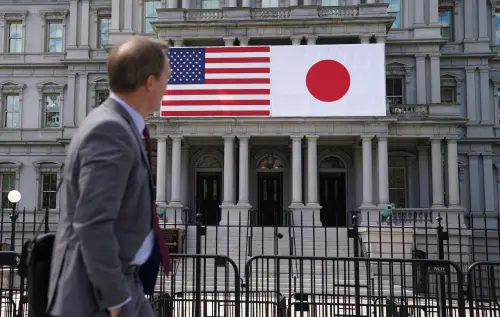Will the new leadership transition in China result in a new approach—either positive or negative—to the Taiwan Strait issue? The short answer is: not likely. Because the transition will be gradual, it is way too early to predict the impact on policy. Because the issue is complex, it is not subject to easy change.
The Chinese Communist Party’s 16th National Congress has answered some questions about the new leadership lineup, but not all. We know that Hu Jintao is the new party general secretary and will most likely become president.
We know that President Jiang Zemin will remain chairman of the Central Military Commission (CMC). We know that Jiang’s proteges are a majority in the Politburo and its standing committee and that most of them do not appear to have much background or experience on Taiwan policy. But there is a lot that is uncertain.
We do not know yet whether Jiang will remain as chairman of three key policymaking bodies: the Leadership Small Groups on national security, foreign affairs and Taiwan.
We do not know for how long Jiang will retain the CMC chairmanship and what his continued chairmanship of the commission means for the policy process.
Nor do we know who will be vice premier for external policy, replacing Foreign Minister Qian Qichen, who has played such a key role in implementing China’s Taiwan policy. Nor do we know who will be foreign or defense ministers.
A sensible working hypothesis is that the more Jiang retains influence in the wake of the 16th National Congress—by keeping key positions himself and by elevating his proteges—the more policy will continue as before.
Thus we should not expect any creative deviation from the “one country, two systems” formula, or any change in the military build-up or united-front strategy.
On the other hand, Beijing will probably not use force against Taiwan unless there is a serious provocation from Taipei. The PRC believes that time is on its side.
In the long term, the stalemate will be fundamentally broken only if Beijing abandons “one country, two systems” or if Taiwan changes its mind about the formula. Limited progress could be made if Beijing did not set political preconditions for dialogue, but this seems unlikely. Even direct links have been held up over a disagreement on the discussion mechanism.
But what about the fourth generation of Chinese leaders? Jiang’s influence will wane at some point and the shift in power from the third generation to the fourth, which is already apparent in the extensive turnover of personnel in the party’s leadership bodies, will gather momentum. At some point, leaders in that rising cohort will dominate Taiwan policy.
Scholars tell us that the Cultural Revolution was the defining political experience for the fourth generation and it left them ideologically less dogmatic, intellectually more sophisticated, more down-to-earth and politically more capable than their predecessors.
Most have received higher education, including post-graduate qualifications, and are concentrated in the fields of engineering and natural sciences, with some economists and lawyers. They seem to be strongly committed to building up China’s power.
Unfortunately, we know little about the fourth generation’s views on Taiwan (or anything else for that matter), since they understood that the best way to gain power is to conceal their policy preferences, at least from the public and outsiders.
Working-level officials from this cohort may have been responsible for the more moderate cross-strait approach China has pursued in the past two years, but there are other explanations for this shift.
Some China scholars speculate that the fourth generation is likely to continue Jiang’s Taiwan policy. And there is every reason to assume that their current views have so far been shaped by the single-minded emphasis on “one country, two systems.”
They have had little incentive to consider contrary points of view—particularly greater accommodation of Taiwan’s views. They no doubt hope that temptation will work and that intimidation will not be necessary.
What does this mean for Taiwan? On the one hand, Taipei should avoid provoking Beijing into thinking that its current, relatively moderate policy has failed and that some kind of military intimidation is necessary.
On the other, Taiwan needs to avoid internal weakness. Taiwan will make better decisions on China policy (whatever those decisions are) only if it has the economic strength of high employment and international competitiveness; the political strength that comes from having a clear and unified view of the nation’s fundamental interests; the military strength that can blunt any PRC temptation to engage in military intimidation; and the diplomatic strength of a sound relationship with the US based on good communication.
This strength will deny Beijing an easy political victory in the near-term and encourage it to think more creatively in the medium term. And should the fourth generation of PRC leaders choose to be more creative and responsive to Taiwan’s views than the third generation has been, Taiwan’s ability to negotiate from a position of strength will serve Taiwanese well and ensure a stable future.


Commentary
Op-edBeijing’s New Leaders and Taiwan
November 20, 2002